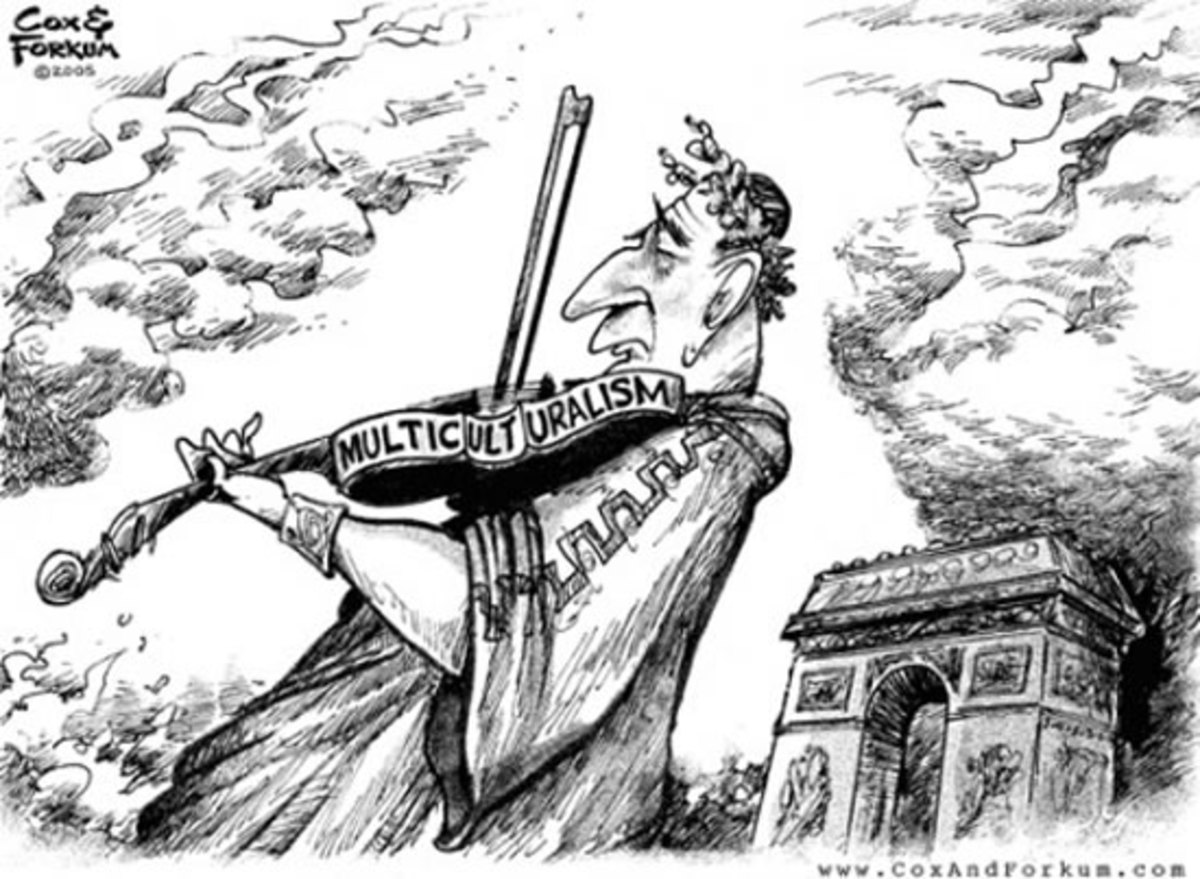Political Apathy and "Fahrenheit 451"
A Song Inspired by "Brave New World"
Arab Protests vs. American Apathy
As I watched events unfold in the “Arab Spring” a couple of years ago, I felt a little embarrassed about the situation in my home country. People in North Africa and the Middle East were risking their lives fighting for rights that we Americans take for granted. And while Americans these days are not thrilled in general with their political leaders, few of us will invest the time and effort to express our grievances out on the streets. In fact, many Americans don’t even bother to vote. Some of this comes from a feeling of disillusionment. But the more prevailing problem, in my view, is apathy. From what I can tell, most Americans could care less about politics. Of course, the regimes recently challenged in the Arab Spring would have loved to have the “problem” of an apathetic population.
So where does this apathy come from? In a sense, widespread apathy is a product of success. We tend to notice things, after all, when they are not functioning very well. We only think about electric power, running water, and well-paved roads when the power goes out, a pipe bursts, or we are inconvenienced by road construction. In the same way, we don’t think about politics if our basic needs are more or less met and the government seems to be performing its basic functions. It is only when times get really tough or political incompetence is even more obvious than normal that widespread unrest may begin to appear. And at those times, the government must fall back on the population’s faith in the system. In the United States, so long as the majority believes in the democratic process, they will express their grievances through the ballot box. This is why more people tend to vote when there is something to be angry about. But in countries that lack this legitimacy, and where the majority of people do not have their basic needs met, the government must rely more on brute force. I’m sure that the regimes of Libya, Egypt, Syria, Bahrain, and Yemen would have preferred to maintain order by promoting apathetic contentment or convincing people of their legitimacy. But if leaders are unable or unwilling to achieve these goals, brute force seems to be the only alternative. And throughout history, brute force has been more the norm than the exception.
"1984" vs. "Brave New World"
More than twenty years ago, I read the novels “1984” and “Brave New World.” After all these years, I have forgotten many of the details, but the general themes of each novel have stuck with me to this day. Each describes a different type of totalitarian state that the novelists envisioned in the not so distant future. The government in George Orwell’s “1984” could serve as a role model for ambitious dictators everywhere. In this frightening future, the government maintains absolute authority through a combination of constant surveillance, systematic brainwashing techniques, complete control of information, and violent repression of anyone who expresses dissent. Big brother is always watching, and the main character, who spends much of the book rebelling against this absolute control, is ultimately tortured into submission.
On the surface, Aldous Huxley’s “Brave New World” seems like a more pleasant future than “1984.” Instead of terrorizing people into submission, the powers that be maintain order by keeping people entertained, superficial, and stupid. People are born in test tubes, so they have no family relationships or close bonds with anyone. Sex is for entertainment, not for intimacy or childbearing. If people ever feel a tinge of unhappiness or boredom, they are provided with plenty of drugs, called “soma” in the novel. Since they are never encouraged to think or feel on any deep level, and technology takes care of most of their basic needs, they have no reason or even ability to question the system. They live in a constant state of superficial happiness. But even in this tightly controlled world, there are people who resist the system. Referred to as savages by the general population, they live outside the urban areas, performing barbaric acts such as growing food, bearing children, and forming real communities. Thankfully, any would-be troublemakers can be cast out to live with these barbarians to a place where they will do no harm.
"Fahrenheit 451"
Recently, I finished reading the novel “Fahrenheit 451” by Ray Bradbury. While reading the book, I was struck both by the prophetic quality of this 1951 novel and by its parallels to “1984” and “Brave New World.” But while “1984” emphasizes government control by brute force and “Brave New World” through the promotion of apathetic contentment, “Fahrenheit 451” includes elements of both.
The title of the novel is a reference to the temperature at which paper burns. Because in this hypothetical world, books are completely banned. Firemen, rather than being public servants who put out fires, are sent out by the state to start them. Their primary job is to burn books and the homes of the people who owned them. Book burning, however, is not the only violent aspect of this world of the future. People are provided with various violent outlets for entertainment, and the threat of nuclear war is always lingering in the background. No one seems to know why, however, this war is being waged. Like “1984”, the state controls people through a combination of fear, violence, and, more than anything, rigid control of information.
A fireman named Montag, the novel’s main character, finds himself questioning both his job and the society in which he lives. He meets a couple of non-conformists who cause him to confront some meaningful, unsettling thoughts and feelings for the first time. He even takes the radical step of collecting books and hiding them in his attic. When Montag calls in sick for the first time ever, his boss, whose name is Beatty, realizes what is happening. Apparently, this is a common “problem” for firemen. Beatty then visits Montag at his home, and he proceeds to give a quick history lesson, explaining how and why this practice of book burning came into existence. And according to Beatty, the general public was not forced into accepting this system. Instead, they were accomplices in this destruction of meaningful information:
“Surely you remember the boy in your own school class who was exceptionally ‘bright,’ did most of the reciting and answering while the others sat like so many leaden idols, hating him. And wasn’t it this bright boy you selected for beatings and tortures after hours? Of course it was. We must all be alike. Not everyone born free and equal, as the Constitution says, but everyone made equal. Each man the image of every other; then all are happy, for there are no mountains to make them cower, to judge themselves against. So! A book is a loaded gun in the house next door. Burn it. Take the shot from the weapon. Breach man’s mind. Who knows who might be the target of the well-read man? Me? I won’t stomach them for a minute.” (Ballantine Books Edition, p. 58)
So by the time books began to be burned, the general public had long since given up reading them. Thoughtful literature, after all, can generate some uncomfortable thoughts and emotions. It can also frustrate the people of mediocre intelligence and limited emotional strength who are unwilling and/or unable to either produce or understand quality writing. According to Beatty, reading comic books, watching sports, attending violent entertainment events, and gazing at the giant television screens that take up entire living room walls became the preferred avenues for entertainment. Montag’s wife spends most of her time watching people that she refers to as her “family”, a bunch of characters who do various mundane, disconnected things on the giant screens all day. Because she, like most people in her society, has no meaningful relationships with actual people, these characters are the closest “people” that she has to a family. When not watching television, she distracts herself by listening to headphones that make a constant buzzing noise, driving her car fast, and taking drugs. At the beginning of the novel, she had recently survived another of her periodic overdoses. So like “Brave New World”, people are controlled through a steady stream of superficial entertainment and mindless distractions.
Bradbury's Vision vs. Modern America
Bradbury’s descriptions of violent entertainment are quite prophetic, and his predictions regarding giant flat screens, continually playing headphones, and reality television are downright striking. But his vision of a future of book burning seems horribly outdated. In our increasingly digital world, we have more access to written information than at any time in history. Through our personal computers and various mobile devices, limitless data is instantly available at the push of a button. So the notion that the state can cut us off from all information is unthinkable.
But after a little close reflection, it becomes clear that Bradbury was not as far off as he might seem. Sure, great literature and high quality news reporting are readily available today. But how many Americans are utilizing their various entertainment and information devices to access this high quality writing? Because there is so much information available, and we increasingly have access to every form of media ever invented for 24 hours per day, it is easy for the good stuff to be drowned out by junk. And the junk, just as Beatty points out in his long speech to Montag, is so much easier on the mind.
Of course, in Bradbury’s world of the future, you still had to physically locate yourself in your living room to watch the giant TV screens, and the headphones only played white noise. But in our world of mobile devices that Bradbury did not foresee, the screen can be in our face at every moment, and those headphones can play so much more than a buzzing sound. So it is in these modern, handheld devices that we see the visions of Orwell, Huxley, and Bradbury come together. As we continually browse the internet and network with one another, our activity is constantly monitored and handed over to people who might find this data useful. So in a sense, Big Brother is watching. The even more disturbing trend for me, however, is the degree to which people in our modern society crave continuous distraction and entertainment. The best strategy, then, for the state to maintain order is not to monitor and intimidate its population. Instead, it is to insure that enough of its population has the resources necessary to be continually entertained. This will keep the masses adequately distracted, appeased, and apathetic. Instead of Big Brother constantly watching everyone, the secret is to keep everyone watching Big Brother.
Check out the new second edition of my book:
A revised version of this essay is included in the recently published, second edition of my (Freeway Flyer/Paul Swendson) American history book. If you click the link below, it will take you to a hub that provides more information, including links to where it can be purchased.





